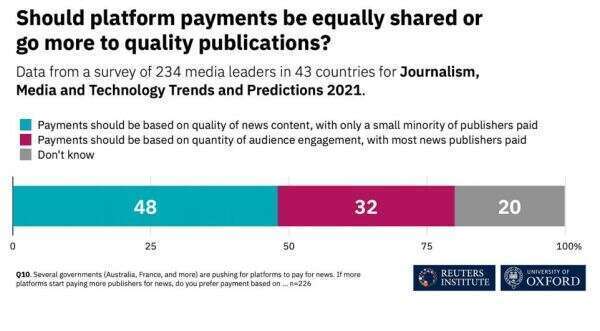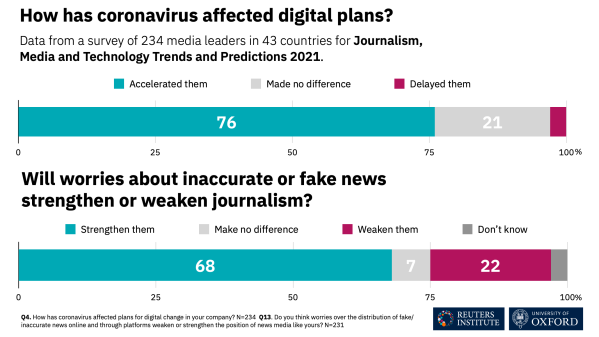
Three-quarters of top media bosses worldwide are confident about their company’s prospects for 2021 according to a media trends survey from the Reuters Institute at Oxford University.
Most said they are focusing on reader revenue models, with driving digital subscriptions deemed important by 76% of 234 chief executives, editors and digital leaders in 43 countries.
They are now seen as the most important digital revenue stream for the first time after being “supercharged” during the Covid-19 pandemic.
The 2021 Journalism, Media and Technology Trends and Predictions report from the Reuters Institute for the Study of Journalism showed display advertising has fallen from being important to 81% of media bosses in 2018 when the question was last asked, to just 66% now.
This is narrowly followed by native advertising on 61% (down from 67% in 2018), while thenumber of “important” revenue streams given by each person shows an increase in diversification.
The survey demonstrated a divided view of whether reader revenue models can work for all publishers, however.
Half (51%) said they could eventually work for most, whereas 41% said they would only be successful for a small minority.
[Read more: How the Seattle Times sold 71,000 digital subscriptions with stories about bridges and tunnels]
Senior research associate Nic Newman, who authored the report, concluded that more medium-sized and smaller publications around the world have started asking for reader payments over the past year but that for many “growth in digital subscriptions won’t be nearly enough to compensate for the substantial falls in print circulation – as well as print and digital advertising revenue.
“While a number of publishers are doing well, a large number of titles are clearly struggling and we can expect further consolidation, cost-cutting and closures in the year ahead.”
Newman also noted it will be difficult to persuade cash-strapped consumers to sign up for new products this year but that e-commerce and events could other significant areas of activity.
The majority of the media bosses were generally optimistic, however, with 73% feeling confident about their company’s prospects in 2021 and just 6% not confident.
Some 53% expressed confidence in the future of journalism, a growth from 46% in last year’s survey which Newman attributed to record audience figures during the Covid-19 pandemic demonstrating that the public values reliable, trusted and accurate information.
Most (68%) said they believed growing worries over Covid-19 misinformation and other fake news would strengthen journalism, while just 22% said they would weaken the industry.
[Read more: How Wall Street Journal used subscriptions ‘science’ to sign up 350,000 new online subscribers in 2020]

Newman said 2020 had been dubbed “the year of the newsletter” but said there may be a backlash coming as consumers struggle to get through all the ones they signed up for and writers who struck it out alone may defect back to “mainstream media, where there is potentially more variety and more editing and legal support”.
Podcasts however have gone from “strength to strength” despite many losing their commute during the pandemic, and Newman expects a significant shift to paid models in 2021.
The report also revealed that 69% of media bosses expect artificial intelligence to be the technology that makes the most impact on journalism over the next five years with improvements to production efficiency and personalisation.
But many feared AI would be beneficial to big publishers and leave smaller ones falling further behind.
And a growing interest in tech regulation throughout 2020, including plans in the UK, Europe and Australia to put more regulatory curbs on Facebook and Google as they are also facing anti-trust charges in the US, means media leaders are twice as likely to think Government intervention will help journalism this year: 36% said so, compared to 18% in 2020.
Newman wrote: “2021 will be a year of profound and rapid digital change following the shock delivered by Covid-19.
“Lockdowns and other restrictions have broken old habits and created new ones, but it is only this year that we’ll discover how fundamental those changes have been.
“While many of us crave a return to ‘normal’, the reality is likely to be different as we emerge warily into a world where the physical and virtual coexist in new ways.”
Read the full report from the Reuters Institute here.

Picture: Reuters Institute for the Study of Journalism
Picture: Shutterstock
Email pged@pressgazette.co.uk to point out mistakes, provide story tips or send in a letter for publication on our "Letters Page" blog
